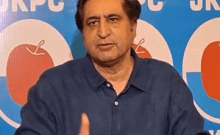Calling the Security Council ineffective and powerless, India has lashed out against its lack of accountability and transparency in mandating peacekeeping operations and blamed it for the rising casualties among peacekeepers.
"We are dismayed at the opaque manner in which the Security Council continues to mandate peace operations, without any accountability or transparency," India's Permanent Representative Asoke Kumar Mukerji said Monday at a General Assembly session on peacekeeping operations.
"The human costs of this failing are evident in both the rising number of casualties among UN peacekeepers, as well as an alarming growth in the number of civilians, now reaching 60 million according to the Secretary General, whose lives are being disrupted by the conflicts that an ineffective Security Council is powerless to resolve," Mukerji added.
As of the end of September, 85 peacekeepers have died this year.
Mukerji appealed to Assembly President Mogens Lykketoft to "take the lead to prioritise agreement on an early reform of the Security Council during this 70th Session."
He also reiterated India's consistent demand the implementation "in letter and spirit" the UN Charter provisions that require the Security Council to consult with troop-providing countries when issuing peacekeeping mandates.
Speaking at the session, Secretary-General Ban Ki-moon also backed the call for better coordination between the Security Council and the troop-contributors. "A shared understanding of the tasks involved between the Security Council and the troop and police contributing countries was required, as was cooperation with national actors and local communities," he said.
The session was centered on Ban's report on implementing the recommendations of the High Level Independent Panel on Peace Operations (HIPPO) which was headed by Jose Ramos-Horta and included Abhijit Guha, a retired Indian lieutenant general.
Mukerji said that implementation report had great importance for India, which is the largest overall troop contributor to UN peace operations, with over 185,000 troops that have served in 48 of the 69 UN missions. India currently has 7,794 personnel under UN's blue flag.
Prime Minister Narendra Modi has offered to increase India's troop-contribution by 10 percent when he participated at a summit on peacekeeping last month, Mukerji said. India would also be adding three police battalions with a high proportion of women and provide training for peacekeepers from other nations, he added.
Mukerji welcomed the "renewed focus on prevention and mediation" in Ban's plan for implementing the HIPPO. All the 42 speakers at the session supported the emphasis on political solutions to end or prevent conflicts to maintain peace.
South Asian countries are the among the largest contributor of personnel to the UN peacekeeping operations. Bangladesh, which is currently the largest contributor, has 9,432 personnel in UN missions, Pakistan 7,533 and Nepal 5,346.
Pakistan's Permanent Representative also welcomed the proposal for better consultations with troop-contributing countries. Like many others, she opposed deploying peacekeepers for counter-terrorism operations.
Bangladesh Deputy Permanent Representative Sadia Faizunnesa called for involving all the countries sending troops to the UN operations in implementing the HIPPO recommendations.














